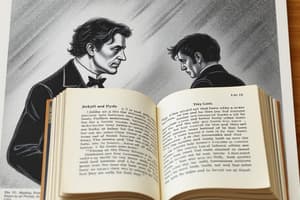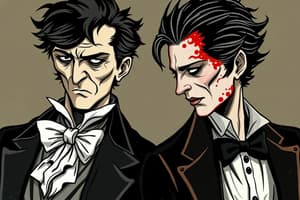Podcast
Questions and Answers
What does Mr. Hyde's unsettling appearance symbolize in the novella?
What does Mr. Hyde's unsettling appearance symbolize in the novella?
- Human Compassion
- Moral Corruption (correct)
- Inner Peace
- Eternal Beauty
Mr. Hyde is portrayed as a character with strong ethical values.
Mr. Hyde is portrayed as a character with strong ethical values.
False (B)
How does Mr. Hyde's violent behavior reflect Victorian fears?
How does Mr. Hyde's violent behavior reflect Victorian fears?
It showcases the primal and untamed side of humanity that emerges when societal rules are disregarded.
Dr. Jekyll believes that by creating Hyde, he can separate his good side from his ______.
Dr. Jekyll believes that by creating Hyde, he can separate his good side from his ______.
Which phrase describes Hyde's method of murder of Sir Danvers Carew?
Which phrase describes Hyde's method of murder of Sir Danvers Carew?
The novella suggests that suppressing human desires can have constructive outcomes.
The novella suggests that suppressing human desires can have constructive outcomes.
What societal aspect does Stevenson's depiction of Hyde primarily critique?
What societal aspect does Stevenson's depiction of Hyde primarily critique?
Match the characters with their descriptions:
Match the characters with their descriptions:
Flashcards
Hyde's Unsettling Appearance
Hyde's Unsettling Appearance
Hyde's appearance is described as unsettling and unnatural, causing unease and mystery. It emphasizes Victorian society's fear of physical deformities reflecting moral corruption.
Hyde's Violent Behavior
Hyde's Violent Behavior
Hyde's violent actions, like the murder of Sir Danvers Carew, are presented as primal and fueled by uncontrollable rage. This reflects Victorian concerns about the untamed, violent side of humanity.
The Duality of Human Nature
The Duality of Human Nature
The novella examines how suppressing desires can lead to destructive consequences. Jekyll's creation of Hyde represents an attempt to separate his good and evil sides, revealing the dual nature of humanity.
Vague Description of Hyde
Vague Description of Hyde
Signup and view all the flashcards
Hyde's Uncontrollable Rage
Hyde's Uncontrollable Rage
Signup and view all the flashcards
Ape-like Fury
Ape-like Fury
Signup and view all the flashcards
Jekyll's Desire for Release
Jekyll's Desire for Release
Signup and view all the flashcards
Suppressed Desires and Violence
Suppressed Desires and Violence
Signup and view all the flashcards
Study Notes
Hyde's Appearance
- Hyde's appearance is described as unnatural and frightening, immediately setting him apart
- His appearance is unsettling and difficult to describe, evoking a sense of mystery and unease
- His unsettling appearance reflects Victorian fears of the unnatural, linking physical deformities to moral corruption
- His appearance is disturbing to a Victorian audience, due to the close link between appearance and character
Hyde's Violent Behavior
- Hyde's violence demonstrates a complete lack of humanity and morality
- The murder of Sir Danvers Carew is described as happening with "ape-like fury," highlighting Hyde's primitive and animalistic nature
- Critics believe that the actions demonstrate the savage, untamed side of humanity
- Hyde's violence is uncontrollable, acting purely on impulse, devoid of empathy or regret
- This violent nature contrasts with the orderly and restrained Victorian society
Hyde and the Duality of Human Nature
- Hyde represents the idea that all people have two sides: a good side and a dark side
- Stevenson portrays Hyde as "pure evil," but Hyde is not a separate being, but rather a part of Jekyll
- Jekyll attempts to compartmentalize his dual nature, through Hyde
- The creation of Hyde allows Jekyll to act on his hidden desires without damaging his reputation
- Ultimately, Jekyll loses control, demonstrating the danger in giving into dark impulses
- The novella highlights that everyone is capable of both good and bad deeds
Conclusion
- Mr. Hyde is depicted as a frightening and evil character
- Hyde symbolizes the darker side of human nature
- Stevenson's novella warns readers about repressing their human nature
- Hyde's actions demonstrate the delicate balance between good and evil
- The novella prompts reflection on individual duality and choices.
Studying That Suits You
Use AI to generate personalized quizzes and flashcards to suit your learning preferences.




